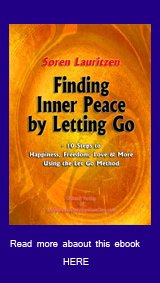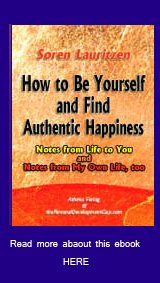Mahatma Gandhi Proved the Power of Truth and Non-Violence
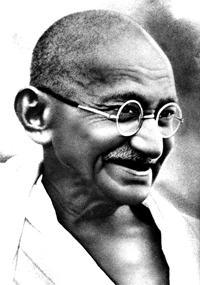
Mahatma Gandhi is a name known around the world. Gandhi altered the course of India and left a lasting influence on humanity because of his stance on change through non-violence.
Mahatma Gandhi was also a prolific writer. He wrote on a near daily basis about subjects as diverse as vegetarianism and politics. The self improvement advice he offered enhanced the lives of individuals and societies alike.
Background of Mahatma Gandhi
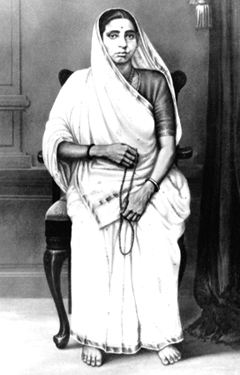
Young Gandhi was heavily influenced by his mother and her beliefs helped shape his own philosophy of life.
He sought spiritual aspects even as a child, an area where he excelled, but was an average student and athlete.
He managed to get accepted into law school in London where he trained in Indian law. While in London, he met members of the Theosophical Society through a vegetarian club he joined. With them, he studied the Bhagavad Gita and developed a keen interest in religious thought.
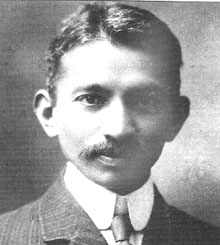
The job he took led him to South Africa for 21 years where he saw the poverty of the indentured laborers of wealthy Muslims. The inequality of the society helped form his political views as he often faced racial discrimination himself. He became awakened to social injustices and took it upon himself to make a difference in the world.
He returned to India and gained popularity as a political figure. He won favor with Muslims and Hindus and fought to gain independence from the British by using the weapons of peaceful resistance, non-violence, and non-cooperation.
Mahatma Gandhi was assassinated in 1948 by a Hindu nationalist over a political disagreement while he was preparing to address a prayer meeting. His death was mourned by India and the entire world.
The Beliefs Of Mahatma Gandhi
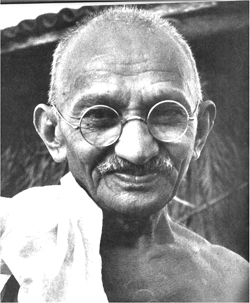
Mahatma Gandhi stated his beliefs were nothing new, he merely tried to live and teach eternal truths as they had been known throughout the ages. He was one of the few people to actually apply these truths to every day life and its problems. Because of that he was even dubbed the Bodhisattva (enlightened being) of the twentieth century.
The beliefs of Mahatma Gandhi include:
Truth. Mahatma Gandhi believed truth must pervade all aspects of life, politics, and decision making. He also felt each must follow his own truth rather than blindly accepting what another claims to be truth. Truth was very important to Gandhi and he even felt it was more powerful than any modern weapon. Non-violence. Mahatma Gandhi was taught the principles of non-violence from childhood. He remarked there were causes he was willing to die for but none he was willing to kill for. He believed in non-violence towards all living things and for that reason he was vegetarian and taught others the wisdom of not killing animals for food.
Self sufficiency. Mahatma Gandhi felt it was important for individuals and nations to be self sufficient and embrace simple living. His vision for India was one where the nation could meet the needs of its people first before it got caught up in industrialization and wealth creation.
Khadi. Mahatma Gandhi believed in dressing in homespun cloth or khadi. It was part of his philosophy because he thought it helped combat poverty and social discrimination. He saw how the west was influencing wealthier Indians, including their dress. Gandhi's mode of dressing was a non-violent protest against the British presence and influence in India.
Fasting. Mahatma Gandhi used fasting as a means of exerting control over his urges and improving his mind and body control. When he did partake of food, he avoided animal products, alcohol, spices, and salt. Gandhi also took a vow of celibacy even though he was married. His goal was to cleanse his spirit by overcoming temptations and pain.
Hinduism. Mahatma Gandhi was drawn to Hinduism, especially Hindu Universalism. He was particularly influenced by the Bhagavad Gita. However, he also believed truth and non-violence were at the root of all religions, and all religions were true and all also had some errors in them.
Freedom. At the heart of the work of Mahatma Gandhi was the belief that all people should be free and equal. His efforts towards this end influenced many other notable historical figures such as Martin Luther King Jr., Lech Walesa, Steve Biko, and Aung San Suu Kyi.
The Writings Of Mahatma Gandhi
Mahatma Gandhi wrote constantly. He wrote for newspapers and wrote letters to many individuals that were later preserved. He also wrote an autobiography.Various collections of his work have been put together by others according to topic or the particular type of self improvement tips or political advice he was offering. The most extensive collection of his writing was compiled by the Indian Government and contains over 100 volumes.
"The Collected Works of Mahatma Gandhi" was published between 1960 and 1994. The Government of India organized the writings of Mahatma Gandhi chronologically and published them in volumes. Each volume is further broken down in a chronological fashion. There are 100 books in the collection. They contain news articles, letters, and transcripts of speeches given by Gandhi from 1888 to 1926.
"The Story Of My Experiments With Truth" is an autobiography written by Mahatma Gandhi. It was originally published in segments as it was written in weekly installments. The stories cover the early life of Mahatma Gandhi up to the year 1920. Decades later, an updated version included collected works from the years 1925 to 1929.
This book was widely acclaimed and was even designated as one of the 100 Best Spiritual Books of the 20th Century. In this book, Gandhi relates tales from his early life as he experimented with spirituality and the principles that would shape his life. He tells of the time he ate meat and of his early marriage at the age of 13.
The book is not a detailed autobiography or filled with self help advice for spiritual seekers. Instead, it tells of the simple experiments Gandhi took with his own daily life to test universal truths such as non-violence, and struggling to master the physical body through fasting and abstinence.
The Legacy Of Mahatma Gandhi
Mahatma Gandhi had a profound and lasting affect on India. He helped gain the country's independence and helped shaped its spiritual future.He also touched the lives of millions of people in other countries and in generations since his passing. While many may not recall much of the political significance of his actions, the one lasting lesson Mahatma Gandhi taught the world was that non-violence is a powerful tool for change of individuals and nations.
The Personal Development Guy's Self Improvement Ezine (FREE)
Would you like to keep in touch - and get high-level tips and special bonuses? Then please sign up for my self improvement newsletter The Personal Development Guy's Self Improvement Ezine. It is totally FREE.
I LOVE Your Support
If you've found the free personal development content on this website useful, please click the Donate button. Your donation will help me to keep producing free, high-level self improvement information. I am VERY GRATEFUL for your support!
Inspirational Quotes, Poems and Funny Short Stuff
If you want, you can also get your personal development, spirituality and general wisdom in an ultra light version - or even add your own wisdom to the site. Just go to the other sister of this website at:
- World's Best and YOUR Best Quotes, Poems and Short Funny Stuff
Quotescoop.com is also known as:
(http://www.inspirational-quotes-short-funny-stuff.com).
High-Level Positive Parenting Advice and Deep Insights
Positive Parenting Ally is the parenting equivalent of the Personal Development Guy. This is where you go if you want really deepen your understanding of parenting, empower your kids and make everyday life more easy and joyful.
Positive-Parenting-Ally.com
- Parenting advice for the conscious, open-minded parent!
Back to the top of this page about Mahatma Gandhi Proved the Power of Truth and Non-Violence
Where Would You Like to Go Next?
To see what has been added to this site recently (plus offers, etc.), check out Blog & News at thePersonalDevelopmentGuy.comTo share your own short self improvement ideas, tips, musings, quotes, stories, spiritual jokes, etc. (and read the short ideas, etc. others have shared) jump to Shared Blog: Self Improvement Ideas
Jump to the Personal Development Guy Homepage
Jump to Self Help Books.
List of articles about self help books listed alphabetically: Alfred Adler, Barbara De Angelis, Maya Angelou Biography, Arjuna Ardagh, Richard Bandler, Brandon Bays, Alain de Botton, Gregg Braden, Brene Brown, Les Brown, Leo Buscaglia, Tony Buzan, Andrew Carnegie Biography, Carlos Castaneda, Pema Chodron, Deepak Chopra, Deepak Chopra Books Paulo Coelho, Stephen Covey, Peter Drucker, T. Harv Eker, Masary Emoto, Timothy Ferriss, Debbie Ford, Viktor Frankl, Mahatma Gandhi, Gangaji, Shakti Gawain, Kahlil Gibran, Daniel Goleman, Amit Goswami, Alex Grey, Stanislav Grof, David Hawkins, Louise Hay, Hermann Hesse, Esther Hicks and Jerry Hicks, Napoleon Hill, Susan Jeffers, C G Jung, Jon Kabat-Zinn, Byron Katie, Robert Kiyosaki, Bruce Lipton, Ramana Maharshi, J W Marriott, Abraham Maslow, John Maxwell, Drunvalo Melchizedek, Anthony de Mello, Anthony De Mello Quotes, Dan Millman, Bruce Moen, Robert Monroe, Michael Newton, Daniel Pink, Dave Ramsey, Ayn Rand Books, James Redfield, Cheryl Richardson, Anthony Robbins, Anthony Robbins Books Carl Rogers, Jim Rohn, Marshall Rosenberg, Geneen Roth, Don Miguel Ruiz, Robin Sharma, Barbara Sher, George Soros Biography, George Soros Quotes, Eckhart Tolle, Brian Tracy Books, Neale Donald Walsch, , Joe Vitale, Lyall Watson, Alan Watts, Stuart Wilde, Marianne Williamson, Larry Winget, Gary Zukav, Best Self Help Books, Self Help Books for Women,






